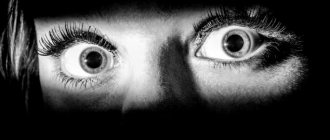Slava Profina 06/20/2018 no comments
0
Among the many phobias that plague humanity, the fear of choking on food is often encountered. For an ordinary person, such a problem sometimes seems funny, but for someone who has a similar illness, it is absolutely no laughing matter. Many people don’t even know what this disorder is called and don’t consider it a disease. In fact, we are talking about phagophobia.
What are fears?
Psychologists consider fear to be one of the basic human emotions, that is, those that are present initially, inherent from birth. This feeling is an integral part of the protective system of the human psyche; it warns of danger and allows you to avoid it.
Accordingly, fear is useful and necessary; pathology is rather its absence, rather than its presence. What then are psychologists struggling with? With obsessive fears that cannot be controlled by consciousness and actually control a person.
Pathology is fears that have no obvious basis. They can be acute, short-term or protracted, constantly present in the mind. Such sensations are characterized not only by mental manifestations, but also by physiological symptoms. And regular repetition of attacks can provoke the development of serious diseases, for example, arrhythmia.
For fresh air? Will not go
There are also people for whom it is best to stay at home. They are called agoraphobes, i.e. those who experience an obsessive fear of open space. This condition is often observed in those who suffer from panic attacks.
Moreover, agoraphobia may include several interrelated and overlapping phobias, for example, fear of traveling alone, traveling on public transport, fear of going to stores, leaving the house, etc. The main symptoms of the pathology include disorientation, dizziness, increased heart rate and even stomach upset.
What is the difference? Phobia and obsessive fear
These two concepts are similar. The difference between them is expressed in the intensity of symptoms, the severity of the person’s condition, the brightness and severity of his reaction to the stimulus. Psychologists say that a person has a phobia if the following conditions are met:
- rapid development;
- the rapid appearance of “absolute” fear when confronted with a stimulus;
- the presence of specific reactions for at least six months.
In other words, if a person was afraid of a spider that appeared before his eyes, there can be no talk of arachnophobia. But if the thought of a “scary spider” does not give rest, does not leave consciousness, an obsessive state develops. This period can last for years. At the same time, when seeing spiders, a person is afraid, but he does not have a pronounced panic, he does not faint, and when visiting a place he does not think about whether the object of his fear is there. After this period, literally overnight, fear develops rapidly. A person sees a spider, but not only feels disgust and fear, but experiences real horror. He literally freezes in place, finds it difficult to breathe, and is unable to react to anything. This moment is the hour of birth of a phobia, the transformation of previously experienced obsessive fear into it.
A phobia can occur without any preceding fears. With a strong shock, it forms instantly and remains for life, unless, of course, a person is engaged in eradicating it.
I won't be left alone
Being alone is the dream of many. But not those who suffer from autophobia. Moreover, this problem manifests itself in different ways. So, for example, some people simply feel discomfort when they are left alone - they feel uneasy, have nothing to do, cannot concentrate on anything. Others may well panic and feel useless.
Psychologists often associate autophobia with a person’s childhood, for example, if he suffered a serious loss - a loved one, a friend, etc. Also, a similar phenomenon can develop if a child has not received sufficient attention from his parents for a long time.
A person who is afraid of loneliness should not try to cope with the problem by ignoring his condition, believing that it will go away on its own. On the contrary, you need to go somewhere more often, make new friends and look for company. Nothing will happen on its own.
What could be the fears?
How to stop being afraid of everything? First, you need to understand the fears you are experiencing, understand their essence, nature and understand the reasons why these sensations appeared. Of course, you need to understand irrational, pathological emotions. Psychologists divide fears into three large groups:
- social;
- biological;
- existential.
Each of these groups is divided, in turn, into different levels. These include fears depending on the degree of their prevalence.
Social ones include negative irrational emotions associated with direct life activities and society. That is, if a person has developed a fear of people or public speaking, then these are social fears. Biological emotions include those emotions that are associated with a threat to life or with nature, fauna, and flora. Existential irrational experiences are associated with intellectual activity; they are actually its fruit. For example, if a person is inclined to think about some rhetorical or philosophical question, for example, about the essence of death, then he may begin to fear it. This group also includes phobias and fears associated with progress and the development of robotics.
Of course, fears do not always appear to a person in a “pure” form. As a rule, people thinking about how to stop being afraid of everything are dealing with mixed fears that are on the border of all three main groups.
Why do pathological emotions appear?
What could be the basis of phobias or obsessive fears, negative irrational emotions? Finding the answer to this question is extremely important. After all, only by realizing the reason for the appearance of fears can you understand how to stop being afraid of something.
Of course, each person has their own, unique source of the emotions they experience. Therefore, only the person suffering from phobias can determine it. Or a psychotherapist. However, all the reasons why fears are formed are divided into three main groups:
- genetic;
- psychological;
- social.
Having understood what fear is and realizing what type of its causes are, it is quite possible to figure out how to stop being afraid of everything. It is not difficult.
Phobic anxiety disorders: treatment in Saratov
Sarklinik provides treatment for phobic anxiety disorders in Saratov for men and women, boys and girls, boys and girls, adults, teenagers, and children. At the first appointment, the doctor will tell you how to treat phobic anxiety disorders in Saratov (F 40 according to the ICD 10 revision), whether agoraphobia (F 40.0), social phobias (F 40.1), specific isolated phobias (F 40.1), and other phobic anxiety disorders are treated (F 40.8), phobic anxiety disorder, unspecified (F 40.9), fears, phobias, fears, can cognitive behavioral therapy help, traditional treatment, methods, homeopathy, systematic desensitization, thought stopping method, yoga, meditation, relaxation, implosion therapy , reflex therapy, medications, drug therapy and remedies, drugs, tablets, injections. On the website sarclinic.ru you can ask a doctor for free, ask a doctor online and get an answer.
Sign up for a consultation. There are contraindications. Specialist consultation is required.
Text: ® SARCLINIC | Sarclinic.com \ Sarlinic.ru Photo: (©) Zastavkin | Dreamstime.com \ Dreamstock.ru | Dreamstime.com \ Dreamstock.ru The woman depicted in the photo is a model, does not suffer from the diseases described and/or all similarities are excluded.
Related posts:
Logoneurosis: treatment of logoneurosis in children, adults, how to treat
Insomnia, treatment of insomnia in Saratov, what to do for insomnia
Neuroses, neurosis, treatment of neurosis, neurasthenia, how to treat
Incontinence, treatment of incontinence in Saratov, Russia, symptoms, signs, causes, types
Occipital neuralgia: symptoms, treatment in Saratov
Comments ()
What could these reasons be?
The names of the groups of causes are similar to the essence of the fears experienced by a person. For example, if you have to deal with a fear of the dark or heights, then the reasons for their occurrence are genetic. These fears are innate, basic. They took on an exaggerated form and became obsessive due to some event or someone’s influence.
For example, a child could be frightened by stories about Babayka, waiting in the dark for those who do not sleep at night. Thus, natural natural fear turned into horror, as a result of which it took hold in the consciousness, developed and became obsessive.
Psychological reasons include negative informational influence from the outside, severe mental trauma or experiences, exaggeration of the significance of existing threats, incorrect assessment of circumstances, and much more. For example, if a person constantly sees crime scenes in news stories and hears stories about pedophile maniacs, then he stops letting his child walk alone, even if he lives in a private cottage, in a gated community and behind a three-meter fence.
The social causes of fear include everything that is in one way or another connected with society and with negative experience. For example, fear of people and problems in communication can develop in a person faced with aggression, ridicule, anger, and rejection. This can happen at any age; almost every embarrassing or negative situation can provoke the emergence and deepening of fears.
How to deal with irrational fears?
The vast majority of people deal with negative emotions very simply. They try to avoid confronting stimuli or ignore what frightens them. But how can you stop being afraid of everything? Don't go outside? Don't turn on the TV? It is unlikely that isolation is a way out of the current situation; most likely, it only strengthens the psychological trap in which a person finds himself due to fears.
Psychologists believe that vague, pointless fears do not exist. It’s just that not every person realizes what exactly scares him. For example, if a crowd of people causes horror, you should try to understand what exactly is causing the negativity. Some are afraid of being crushed, others are afraid of the smell, and others are terrified of the limited space around their body. The list can be continued and expanded. If a person is afraid of crowds of people in a subway car, then he may be afraid of the crush of an accident, or he is afraid that in the event of a disaster his body will not be identified and will be buried along with the others.
It is possible that the fear of others lies in the fact that a person is ashamed of himself, of some personal characteristics. Let's say that in early childhood he stuttered or lisped, and other children laughed. As an adult, the person forgot about it, but the fear of communication, speaking, or just crowds of people remained.
Accordingly, how to stop being afraid and shy of everything? You need to specify your fears, consider them, “get to know” them, and only after that start the fight. After all, it is impossible to defeat an enemy about whom nothing is known.
How to deal with phobias?
An Epidemic of Fear The word “phobia” has become fashionable. For example, my colleague Sveta is afraid of returning home late alone and therefore proudly announces at the end of the working day: “I have this phobia: I’m afraid that someone will attack in a dark alley!” But in fact, the phobia has nothing to do with it. Sveta is simply afraid. And fear is useful, it is what tells you how to avoid dangerous situations and even saves life. Fear also arises as a reaction to potential danger, and when we worry about loved ones, are afraid of the unknown, or watch the movie “The Texas Chainsaw Massacre.” When the danger (real or virtual) has passed, then the fear will disappear, writes gigamir.net. But a phobia (from the Greek word phobos - fear) is not just fear, but a state of obsessive fear that is impossible to cope with on your own. The phobia does not leave you alone, and the imagination continually draws horrors, placing a frightening object or event at the center. A patient with a phobia develops vegetative reactions: he turns red or pale from fear, his hands tremble, and sweating increases. To avoid unpleasant sensations, patients with phobias choose “avoidant behavior,” that is, they refuse situations that cause the phobia. Irina (19) says that she never uses the elevator and even in high-rise buildings takes a long time to climb endless flights of stairs, because she cannot overcome the fear of getting stuck in the elevator car. According to statistics, many people are susceptible to numerous phobias to one degree or another. These fears, of course, do not arise out of the blue. Fears develop, as a rule, on the “fertile” soil of psychosis, neuroses, and, which is completely natural, are a consequence of brain damage. Growth factor According to the World Health Organization (WHO), more than 10% of the world's population have one or another phobia. Experts count several hundred obsessive fears, and their number is growing. People are afraid of natural phenomena, diseases, their own feelings, food, numbers...Technological progress brings new fears. Well, could your great-grandmother be afraid of the computer? And now cyberphobia (fear of working at a computer) quite often haunts older people. And for progress itself, fear was found: prosophobia (fear of progress) - an obsessive fear of everything new in science, technology, and everyday life. Someone has developed an incredible fear of contracting a fatal disease (nosophobia). Social phobia - contact with other people causes not just fear, but inexplicable horror. For some, closed spaces become a reinforced concrete cage from which there is no exit. Recently, more and more people who are forced to quit their favorite jobs are becoming ill with claustrophobia. And the reason for dismissal is completely banal - stuffy offices that really resemble cages. The picture is completely different for those suffering from a fear of open spaces, or agoraphobia. For these unfortunate people, the very thought of crossing the road brings so much trouble that they are ready not to leave the premises, just to avoid being in an open area. The horrors of our town Residents of megacities are visited by phobias twice as often. Not the least role in the formation of phobias belongs to the media. So, as Bulgakov’s hero Professor Preobrazhensky used to say, “don’t read Soviet newspapers before dinner.” And in our time we must add: “Don’t watch TV and don’t get carried away with horror films.” Most often in big cities, people are afraid of loneliness (isolophobia and monophobia), transport, germs and infections. How can a young beautiful girl be afraid of loneliness in a city where the population has exceeded ten million?! However, hundreds of girls (and boys) cannot get rid of the thought that no one loves them and no one needs them. The subway is another urban horror. And, although emergency situations in the underground are very rare, we are frightened by the confined space and the inability to quickly leave the underground. With this phobia, we strive to cover long distances by any ground transport (even if it takes several times longer), just to avoid going down the subway. Risk group People who are most susceptible to phobias are impressionable, vulnerable, sensitive and intellectually developed. And such positive qualities as responsibility, caution, pedantry can provoke phobias. Helps to gain a phobia and a rich imagination. Three times over the shoulder Phobia not only deprives us of freedom of movement, but also forces us to obsessively perform rather absurd, “protective” actions and rituals. This helps us get rid of fear for a while and reduce anxiety. My friend Olya (27) never steps on cracks in the asphalt, and also counts steps and bearded men all the way - she is sure that only this will protect her from failures during the day. Anya (25), in order to avoid infections, established a complex sequence of hand washing: 3 times with green soap, 2 times with blue soap and once with yellow soap. Needless to say, she rubbed her hands almost to holes. Understanding perfectly the senselessness of such actions, patients are still forced to repeat them exactly. And if they are distracted, they start all over again. Male phobias Venustraphobia is the fear of beautiful women. Infantile dizziness, cardiac orgasm and shortness of breath to the point of fainting engulf a man when he tries to meet a woman whom he evaluates as very beautiful. Usually, a poor man suffering from venustraphobia runs away from such beautiful ladies without looking back. The next obsessive male fear is intimophobia - the fear of sex with the woman he truly loves. With the rest, oddly enough, everything works out for him. Psychoanalysts define this problem as a split personality: on the one hand, sublime love for one’s ideal, on the other, attraction to other women. If left untreated, in some cases, intimate phobia can result in psychosexual pathology, which, you see, is also not very encouraging. There are two more male fears - gamophobia and penteraphobia. These fears are not so common, so we will only talk about them briefly and concisely. Gamophobia is the fear of marriage. In fact, a small percentage of men suffer from this disease. The rest are just pretending. And penteraphobia is the fear of one's mother-in-law. Hard case. To get rid of their fears, people have to consult doctors, but before starting treatment for a phobia, it is necessary to understand the cause of its occurrence. The origins of these fears are mainly found in a person's past. Once having been in an accident, it is quite natural for a person to be afraid to get behind the wheel. Our brain has truly unique qualities. One single plot, “snatched” from the memory of past lives, becomes the cause of obsessive fears. Let’s say that in a past life a person was imprisoned in a cramped dungeon and, quite possibly, in this life he is guaranteed a panicky fear of closed spaces. The fear of blood is due to the fact that in a past life a person was subjected to cruel inhuman torture and then brutally killed. But the above phobias existed even before our scientific and technological progress, which, of course, does not stand still, and the more developed it becomes, the more new phobias appear. Many people have a fear of heights, and you should sympathize with these people, because they have a daily struggle with this height: going up to their apartment (or office), located on the 10th or 20th floor, is tantamount to performing a feat for them. Mobile phones, household appliances, and computers have also become the subject of suffering and phobias. And just the news of the unfavorable state of affairs regarding the environment gives rise to a pathological craving for cleanliness. Fear of germs forces us to constantly wash our hands with soap and other disinfectants. The fear of biochemical and radioactive contamination, as well as dust, forces people to stay in rooms where windows and doors are tightly closed. There are simply too many phobias to count these days, and one article would not be enough to list them. But how can you learn to overcome your fears? First, you need to establish what kind of fear lives in you, and what you fear most. You should think carefully about whether you are in any danger at the moment. After this, it’s worth thinking about: is there a possibility of getting into a particular situation in which a certain form of your phobia may certainly manifest itself. Most cases indicate that the chances are very small or completely excluded. If you cannot cope with your fears on your own, contact a hypnologist who will certainly help you. Indeed, thanks to regressive hypnosis, it is quite easy to understand the subject of your fears, because... this “object” is at the very bottom of your memory. ADVICE After everything you have read, do not try to find any phobia in yourself, otherwise phobiophobia (fear of phobias) or aphobiophobia (fear of the fact that there are no phobias) may arise. But the most important thing is that you are confident in yourself. As our well-known Carlson used to say: “Calm, only calm!”
How to specify fears?
Psychologists use two methods to specify fears. This:
- immersion in a frightening situation;
- visualization of the stimulus.
What does this mean? A person imagines his fear and the further development of events. He seems to be experiencing in his imagination everything that he is afraid of.
During the presentation process, describing his feelings, a person will definitely identify what really scares him. For example, when talking about being in an imaginary crowd, a person may mention that the floor is disappearing from under his feet and he can’t breathe. This indicates a form of claustrophobia, that is, in fact, a person is afraid of crowds of people only because their bodies limit the space around him and prevent him from seeing what is happening in the distance.
Is it possible to use these methods without the participation of a psychotherapist? Without a doubt, yes, but you will need the help of another person. Someone must hear the description and remember it, separate key, important phrases. If you don’t have anyone to turn to for help, you can use gadgets and record yourself on a video camera or voice recorder.
How to deal with phobias?
Phobia and irrational obsessive persistent fear are related concepts. Accordingly, the fight against them is the same. But there is an extremely important nuance. A phobia is a serious mental disorder, and it is possible to cope with it on your own only at the very beginning of its appearance. Treatment of phobias is carried out comprehensively, it involves:
- psychotherapeutic sessions;
- taking medications;
- hypnosis.
In case of prolonged impact of phobia on consciousness, a person may need help from doctors dealing with physiological problems. This mental disorder often leads to serious illnesses that require treatment.
How to stop being afraid to communicate with people? How to speak and speak in public with confidence?
This is a very common fear, which is caused by completely different reasons. First you need to understand what exactly a person is afraid of. Is he shy to start a conversation? Is he afraid that he will be rejected, not answered, not paid attention? Perhaps he doesn't understand how to keep a conversation going and get people interested? Or maybe a person is simply afraid that his breath smells bad?
It is very important to understand the essence of fear and specify it. After all, the way to deal with irrational emotion depends on this. For example, if a person is embarrassed about his teeth or breathing, then there is no need to engage in self-analysis; he needs to go to the dentist or buy a mouthwash at the pharmacy.
In most cases, shyness is based on low self-esteem and negative personal experiences. How to stop being afraid to speak, speak in front of an audience, communicate? Psychologists advise the following:
- remember that self-perception is subjective and not the truth;
- voice your emotions, for example, start your speech with the phrase: “I’m terribly worried”;
- learn to speak, practice in front of a mirror, visit a speech therapist if necessary, take public speaking courses;
- If you are very nervous, take a break, take a deep breath several times and forcefully release the air.
Of course, you can't avoid people. On the contrary, you should constantly communicate and get to know each other. If this is not possible, you should get a job in which communication and contacts are part of the work process. For example, you can work as a sales consultant.
Refusal from public speaking
Performance anxiety has now been dubbed the scourge of modern times. After all, it is becoming increasingly difficult to find a person who does not have stage fright. According to research, 96% of the world's population suffers from glossophobia. As a rule, it manifests itself in the fear of speaking in front of a large audience. But it also concerns interviewing and passing exams. At the most crucial moment, a person becomes covered in perspiration, gets nervous and even panics, has a dry mouth, trembling all over his body, and his legs become weak.










